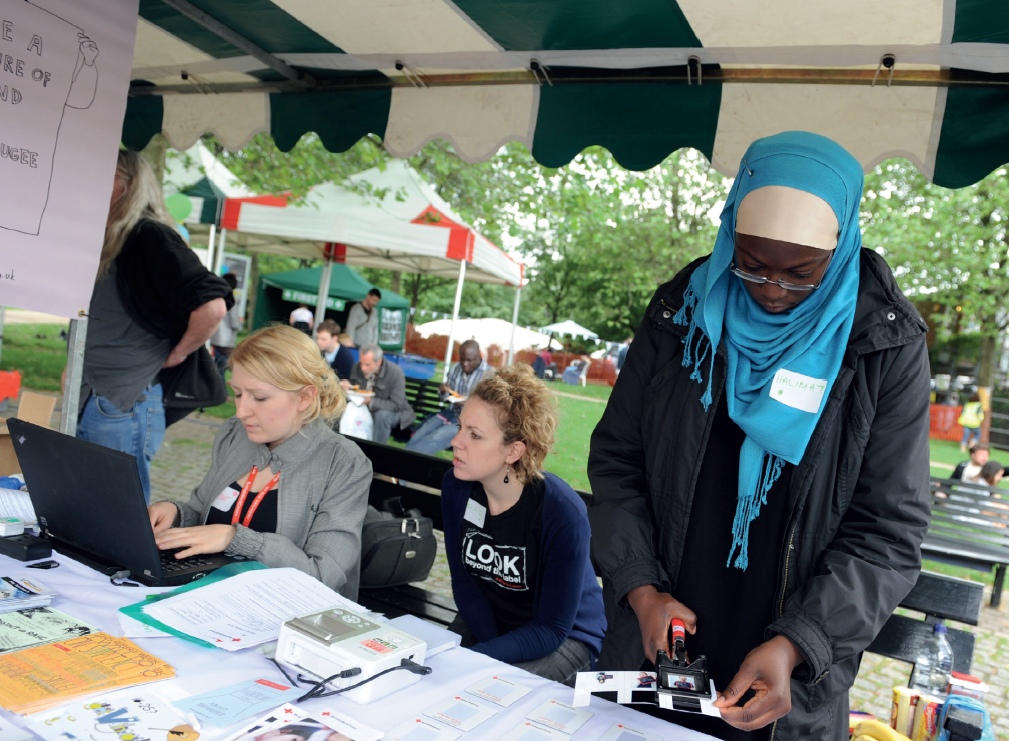Red Cross EU Office Director speaks at the European Parliament on the integration of refugees
On 18 February, Director of the Red Cross EU Office, Denis Haveaux, spoke at the European Parliament’s Committee on Employment and Social Affairs’ public hearing on "Refugees – social inclusion and integration into the labour market”. During the hearing, Members of the European Parliament (MEPs) discussed the conditions necessary for the integration of refugees in the European Union (EU), including their access to the labour market.
Migration experts from the International Labour Organisation (ILO), the Flemish Agency on Civic Integration, the German Federal Employment Agency and Italian Trade Union, Unione Sindicale di Base, joined Mr Haveaux as guest speakers to share their insights into the practical challenges faced in supporting better labour integration for refugees in the EU.
Having a job empowers refugees, facilitating their social integration and increasing their chances of enjoying decent living conditions, including adequate housing. It is therefore essential to support access to the labour market for asylum seekers and refugees.
"We believe that access to the labour market is a crucial determinant of lasting integration,” said Mr Haveaux, as he welcomed the work foreseen in MEP Brando Benifei’s own-initiative report on "Refugees: social inclusion and integration into the labour market”. However, he stressed several conditions that should be implemented first in order to ensure effective and efficient social and professional integration.
Most of the refugees arriving on European shores have been through a long and traumatic journey, leaving many of them exhausted and traumatised. Before envisaging any labour integration, it is important to address their vulnerabilities and specific needs. Emphasis should therefore be placed on "policies and practices that improve the insertion of refugees into the labour market, while taking into account their individual situation, meaning their needs and personal views,” said Mr Haveaux.

To facilitate their access to the labour market, it is crucial that the skills and qualifications of refugees are swiftly assessed and recognised. In this regard, he shared the example of a new Danish Red Cross project, which aims to assess refugees’ competences and qualifications before they leave reception centres. Mr Haveaux underlined the importance of taking stock of "soft” skills such as informal work experience, as well as the value of providing language and vocational training to all refugees so that they can reinforce their skills and improve their chances of securing employment.
“The lack of networks, be it social, family or work networks, makes it more difficult for refugees to integrate,” said Mr Haveaux, as social networks greatly affect the likelihood of successful integration. “Therefore, programmes focusing on twinning, mentoring, buddy projects and job placements should be further developed across the EU,” he added, citing the example of the Spanish Red Cross "Employment Plan for Vulnerable Groups” programme which aims to foster the capacities and skills of vulnerable people, while fighting stereotypes that could prevent them from accessing the labour market. In 2014 for example, 96,410 people participated in this project co-funded under the European Social Fund, and 31% of them were migrants.
Access to dignified housing and basic services such healthcare and education, should not be overlooked in debates about the integration of refugees. Beyond participation in the labour market, social assistance measures are also essential, including rehabilitation and psychosocial support. Furthermore, the constant worry for family left behind, as well as the absence of any relatives to provide support in the country of asylum, increase the vulnerabilities of refugees and hinders integration. "It should be recognised that refugees have more difficulties to integrate when their right to family life is not safeguarded,” said Mr Haveaux. "Reunification with family members is therefore a powerful tool to empower refugees and give them the feeling that they can start settling and integrating in their new host society.”
Finally, Mr Haveaux pointed to the fact that "one of the key obstacles refugees face and that hinder their access to the labour market relates to discriminatory attitudes, stereotypes and xenophobia,” and he encouraged the European Parliament to continue to promote the positive contribution that migrants and refugees make to European culture, development, and economic growth. Red Cross National Societies in the EU advocate respect for diversity and fight intolerance, prejudices and discrimination through "awareness among the local population on the realities of refugees and asylum seekers, the challenges faced by migrants, and the opportunities global migration presents.”
Integration is a long-term process that should start during the asylum procedure, with policy proposals that promote long-term commitments. "Successful integration requires consideration not only of measures to labour market inclusion, but also of other additional services and measures such as family reunification, access to healthcare, psychosocial support and rehabilitation, as well as legal counsel and language training,” concluded Mr Haveaux.
Watch the full public hearing here.
For media inquiries, please contact Eva Oyón on: eva.oyon@redcross.eu or +32 2 235 09 22

